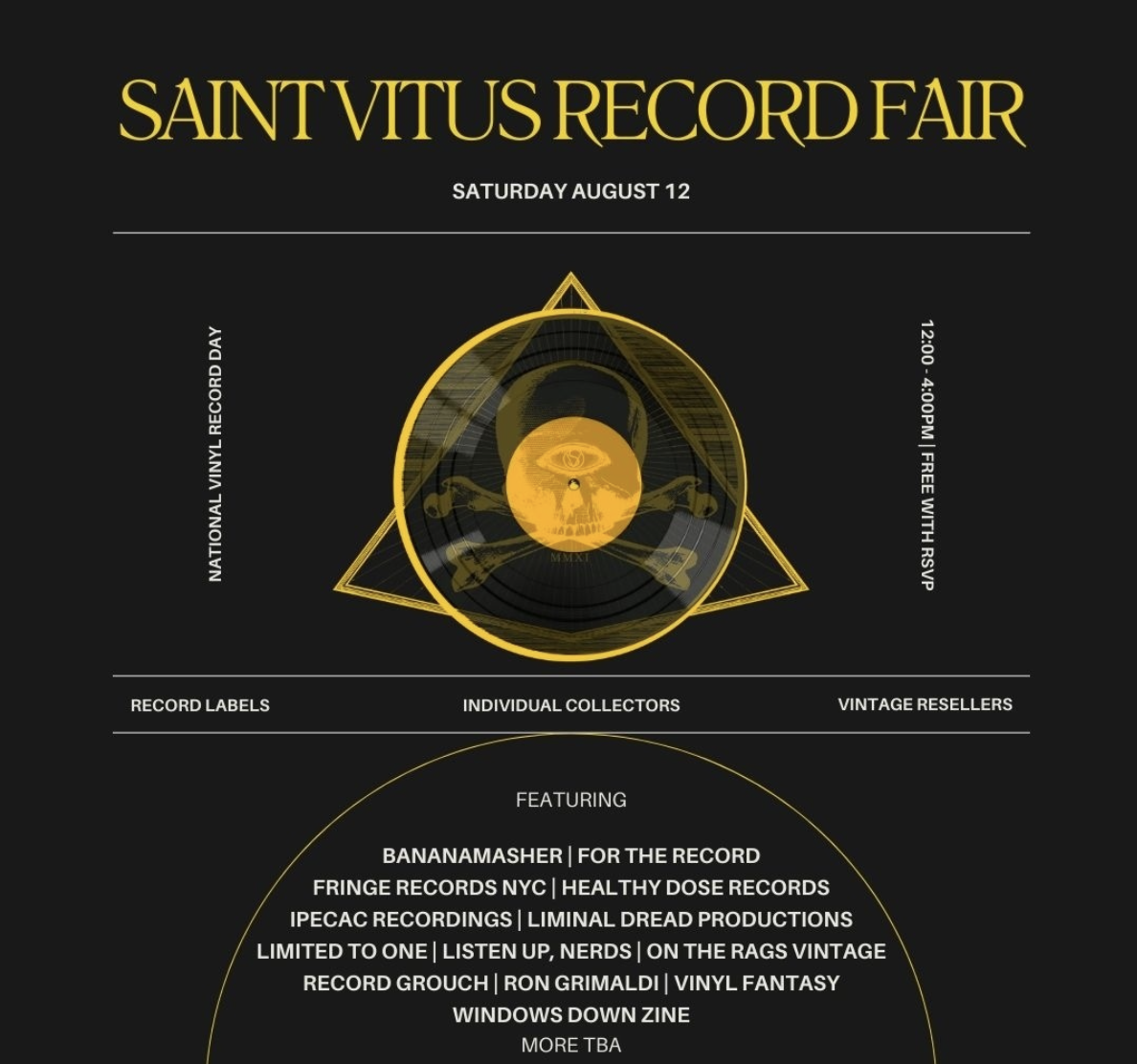Listen Up, Nerds 41: Growing Plants

Before I get into the post today, I wanted to let you know about a cool thing going on in Brooklyn this weekend. My friends at Saint Vitus are hosting a record fair and I'll be there slinging some LPs and vintage shirts from my collection. Come on down and buy some stuff if you're so inclined. I'll cut you a deal if you mention the newsletter or bring cash. Even if you don't buy anything from me, there are a ton of other vendors who will be selling all sorts of dope stuff. Here's the flyer, check it out and I'll see you this Saturday.

Kat Moss from Scowl put out a statement yesterday addressing the rumors that Scowl are an “industry plant” and how it’s reductive and insulting to insinuate that a band with a woman in it could only see artificial success instead of real success. I completely agree. I also hadn’t heard that rumor before, so I looked up “scowl industry plant” on Twitter to see if there was a reason that this statement came out and there were three tweets that contained “Scowl industry plant” in some form or another, including one that was clearly a joke. There are now a ton of posts from people who say that they've called Scowl an industry plant at one point or another, but it's not on the internet. Word of mouth still works. Go figure.
Anyway, it’s obviously wrong to accuse them of being an industry plant. They’re not. That’s just a fact. The band does a great job promoting themselves, they tour their asses off and make friends. It’s not hard to see success when you excel at these things. There’s some luck involved, too, but why be lucky when you can be good?
Hardcore is not big enough to have industry plants, let alone its own industry. Some of the biggest labels are run by people who still need other jobs outside of punk rock to survive. That’s just how it is in independent music in 2023. It’s not a money-making endeavor. The idea that these people are put here by the Taco Bell (Brought To You By Yum! Brands [A Subsidiary of PepsiCo]) Industrial Complex to sell you Beefy Nacho Sliders or whatever is asinine.The fact of the matter is that Scowl is a band who is good at being a band. They've been around for years, remaining vocal and dedicated to their scene even before they were a band together. They play the game better and harder than most people and their somewhat meteoric ascent has been a product of that.
It’s not as bad as being blatantly misogynist, but the lack of imagination required to call someone an industry plant in hardcore is terribly insulting. It’s self-inflated and it’s so far up its own ass that it’s willfully ignoring how small this scene truly is. It even casts these people as celebs, to a degree, when half of the appeal to hardcore is that you can get up on stage and touch these people if you really want to. I’m guessing the average Listen Up, Nerds Newsletter reader is aware of that, but it’s got to be said as a qualifier.
Where does this come from? The industry plant rumor started about a decade ago, from what I can remember, and rose from the hip-hop discourse machine. For years, it was lobbed on the internet at artists who would have a hot “street single,” only to sign to a major label within the next couple of months. Think Trinidad James and Bobby Shmurda. I don't agree with that, but those were consensus picks. Think Ice Spice now. This would give authenticity to the label and the artist, along with showing the fans that their outpouring of support really does something. It moves a needle, it gives a guy a job, it moves units and makes numbers get bigger! Leor Galil did a great job explaining the history of the term and where it came from, along with its attachment to female artists as if their success or art could only be the product of a coordinated marketing effort.
Raury, one of the first artists I remember getting the label of “Industry Plant,” wore a shirt with “Industry Plant” on the front of it for his 2015 XXL Freshmen cover shoot. “My ‘Not An Industry Plant’ shirt is raising a lot of questions answered by the shirt,” jokes aside, his placement did seem suspicious. Nobody was clamoring for a Raury release. The streets were not looking out for that new Raury. He was skilled, but he was already signed to Columbia. He had a collab with Lorde that nobody heard shortly thereafter. What was going on? XXL readers didn’t care for him and he went off to find moderate success with another audience. Nobody who’d ever care about Raury would care if he was “real hip-hop” or not.
Which brings us back to the Scowl rumor mill. Hardcore and other guitar-based music subcultures trade in authenticity the way that rap does, and honestly, probably kept it going longer than rap did. That died when Rick Ross didn’t even acknowledge his past as a CO after rappers attacked his drug dealing credentials left and right. Punk and its subsidiaries are all about being “real,” I guess. I think they were, once. Whether it meant you were tougher than another guy or poorer or struggled more or hustled harder, it mattered that you suffered for your art in one way or another. We no longer value that. I’m not sure if that’s a good thing or not. I think it’s good that people don’t struggle, but I do worry that cheering your friends on for “Getting the bag” is getting in the way of a great history of protest art and subversion. It’ll never kill that tradition outright, but I’ve stated time and time again on this blog that politics have fallen out of the spotlight and we’ve strayed a little far from what makes “punk rock” punk rock. Capitalism does a great job of making us all complicit in its agenda.
If it’s okay and somewhat encouraged for a band to do things that were once considered “Selling out,” like licensing music to a commercial or signing to a big label, then why should an average shmuck care about authenticity? Scowl’s case has misogyny written all over it, but pretend this argument is about someone to which that doesn’t apply. What’s the fallout for not being authentic? Gatekeeping is bad, so nobody is a poseur. Hating on someone getting money is bad, so there’s no selling out. Music isn’t bad anymore, it’s “not for me but I respect what they’re doing.” There’s no good reason to care about whether or not a band is “the real deal” or “hardcore” or “legit” if there’s no consequence for not being those things. The fact of the matter is that focusing on legitimacy no longer means anything. It’s a brand identity just like anything else in music as long as music is something to be marketed rather than something that resonates with an audience. It’s all Coca-Cola at this point: The Real Thing.
Do I have a solution for this? Gatekeep harder, call music bad, listen to Fugazi until your brain is calcified. Ask yourself, “Is this art or a product?” whenever listening to music. Ask yourself, “Is this a marketing ploy?” any time you see anything. Become paranoid about the tendrils of capitalism working their way around everything you love. Be unafraid of it all and remind yourself that “punk rock” was a branding exercise from the jump. Remember that you’re the only one with your moral compass and do everything for yourself, allowing it to exist but outside of your life. Put faith in those around you or be overly protective of your own time and consumption. Or, straddle the line: Be discerning and start a blog and dedicate your voice to what you find valuable and resonant. I’m looking forward to reading your blog whenever you start it.

Comments ()